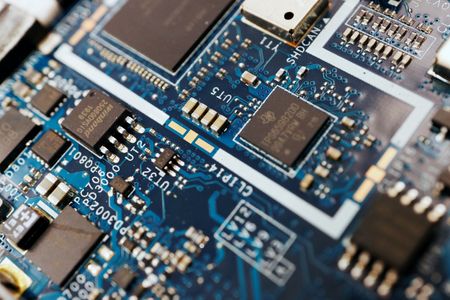By David Shepardson
WASHINGTON (Reuters) -U.S. House and Senate lawmakers said Thursday they have chosen negotiators to hammer out a deal on a bill to provide $52 billion in government subsidies for semiconductor production after months of discussion.
House Speaker Nancy Pelosi, a Democrat, and Republican House Leader Kevin McCarthy named about 80 House lawmakers including the chairs and top Republicans on some key committees that will take part in a process known as a “conference committee” to reach a compromise version.
The Senate first passed chips legislation in June that also authorized $190 billion to strengthen U.S. technology and research to compete with China, while the House passed its version in early February that contained different provisions aimed at boosting competition with China.
A persistent industry-wide chip shortage has disrupted production in the automotive and electronics industries, forcing some companies to scale back production.
There are growing calls to decrease reliance on other countries for semiconductors and the White House says funding is an urgent national security concern to ensure long-term U.S. supply of chips.
In 1990, the United States produced 37% of all chips while today it accounts for only 12% of global production.
Senate Majority Leader Chuck Schumer, a Democrat, and Republican Leader Mitch McConnell said Thursday they are also both naming 13 negotiators.
“The Senate must now restore a product that reflects what passed this chamber with bipartisan support,” McConnell said. “Without major concessions and changes from House Democrats, this legislation has no chance of becoming law.”
The House bill has several trade provisions and would authorize $8 billion in U.S. contributions to the Green Climate Fund, established by the Paris Agreement to combat climate change.
Schumer said negotiators will ensure “the Senate-passed bill stays on track to create more good-paying jobs, boost domestic manufacturing, and spark American ingenuity.”
On Wednesday, the White House held a classified briefing with lawmakers to discuss the “escalating vulnerabilities” to the U.S. economy from the chips supply chain.
Commerce Secretary Gina Raimando said the administration would work to help lawmakers reach consensus, saying the legislation “brings home manufacturing jobs, secures our supply chains, and helps America stay globally competitive.”
(Reporting by David ShepardsonEditing by Chris Reese, Bernard Orr)











